Lian Li Galahad II Trinity Performance Review
Introduction
Using a new double wave fin design, Lian li tried to double the potential performance of their latest and greatest AIO. To make things even better, they made the radiator 32mm thick, added thicker tubes, and slapped high-performance fans on top! Let's take a closer look and find out if Lian Li managed to create the most powerfull AIO out there.
Positive
- Price is actually okay
- Best in class performance
- Solid but decent RGB pump cover
- Long Tubes
- Good Quality Sleeving
- Adjustable 45° Fittings on radiator
- Changeable Pump Convers included
Neutral
Negative
What's in the box?
Similarly to the entry-level Galahad II Trinity, the Performance sub-version comes completely preassembled. The Fans are already daysi-chained and the cable is hidden within the fan frame.

Except for the relief of installing the fans yourself, the Galahad II Trinity Performance comes in a standard AIO package containing the following items:
- Lian Li Galahad II Trinity 360 Performance
- Installation Hardware AMD & Intel
- Thermal Paste with Spreader and 2x Application stickers
- Connection cables for L-Connect 3

Down below you will also find a short summary of the AIOs specs.
| Name | Lian Li Galahad II Trinity Performance |
| Dimensions (Radiator) | 396x130x32mm |
| Color | White / Black |
| Fan Airflow | < 108.29CFM |
| Fan Noise | < 39.9 dBA |
| Fan Air Pressure | < 4.08 mm/H2O |
| Fan Speed | < 3000RPM |
| Fan Connection | PWM |
| Pump Connection | PWM |
| RGB |
Yes on the Pump Cover, fully customizable with Lian Li L-Connect 3 Changeable covers with different designs included |
Compatibility
By default, the Lian Li Galahad II Trinity Performance comes with the Intel mounting brackets pre-installed. In combination with the appropriate backplate, these can be used on either an LGA 17/1200 or LGA 115x socket.
In order to use it ontop of an AMD chip, only the retention bracket on the pump side needs to be replaced. For the installation, the original AMD retention brackets should be used.
| AMD | Intel |
| AM5 | LGA 1700 |
| AM4 | LGA 1200 |
| LGA 115x |
Individual Components
Tubes
Although the tubes are solely 400mm long, they are full of new ways of implementation. At the radiator and pump end, the fittings are adjustable making it easier to route them. Additionally, the radiator fitting is pertruding to a larger degree than the fans height, making routing even easier. However, the biggest surprise came in form of a 45° angle added on the radiator side. This angle makes them not only incredibly easy to route, but also removes the need for a large portion of the bend towards the pump. This may not actually add any tube length, but prevents you from leaving any behind for an unnecessary bend.

On the inside, the tubes got some surprises too. Instead of the usual 5 to 6mm inner diameter, the tubes on the Galahad II Performance are 7mm thick. This creates a much higher waterflow resulting in a higher potential performance.
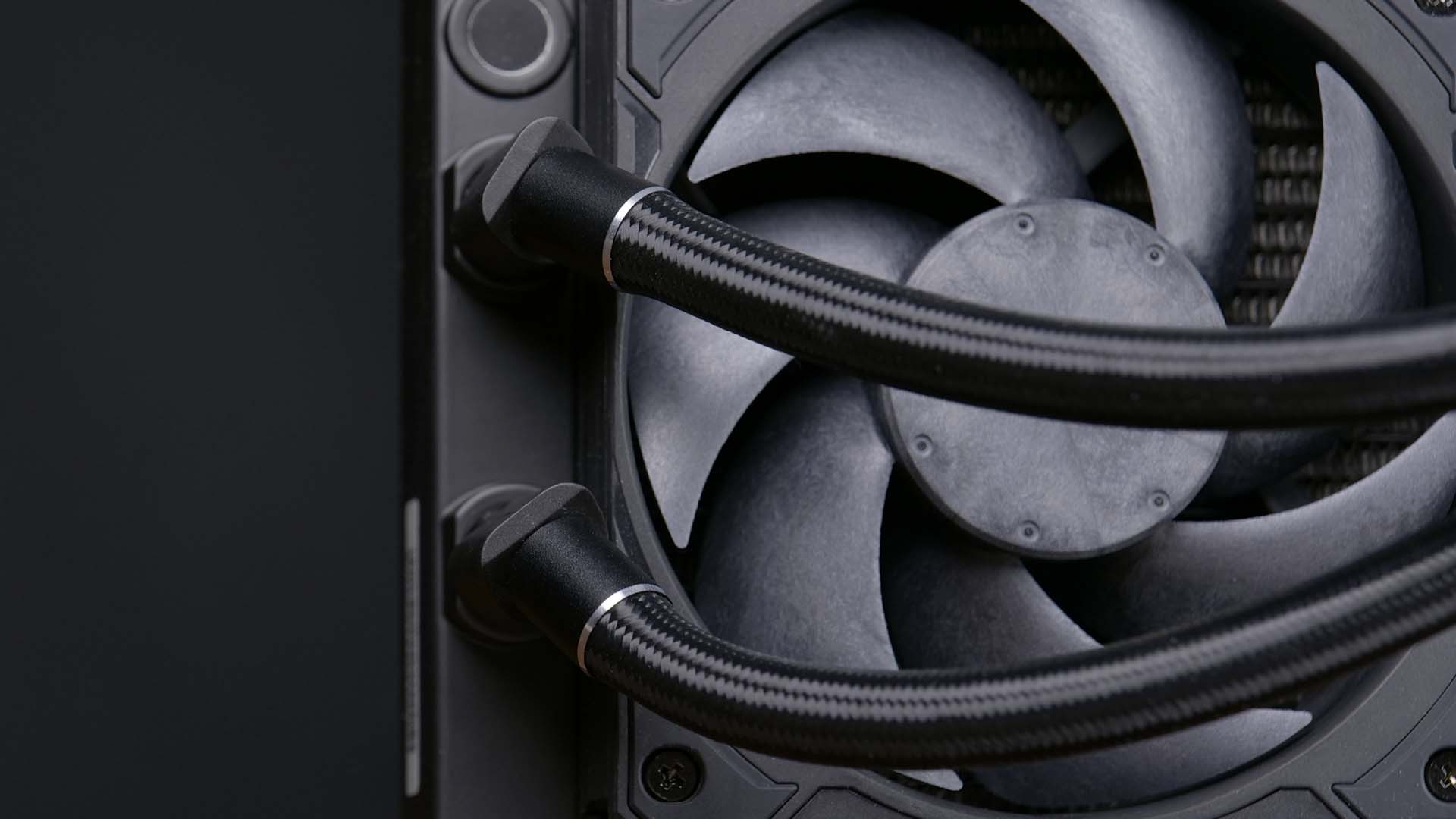
Then as a nice bonus, Lian Li made sure to use relatively high-quality sleeving and added a little leather-like strap to allow you to keep the tubes tied together.
Radiator

If the mini-upgrades for the tubes weren't enough, the actual performance-enhancing aspect of this AIO is hidden within the radiator.
Not only is the radiator 32mm thick, creating already additional cooling real-estate compared to most AIOs out there, but Lian Li also built in something they called "Double Stack Fins" or "double wave fin". Although it might sound fancy, it's actually quite simple. Instead of the fins making a "V" shape from one water channel to another, there's a very thin sheet of metal in between each channel with a "V" shaped fin on each side touching the water channel on every side.
Already by the looks of it, it is significantly more total fin area than we are used to.

Let's hope this translates into performance.
Fans
The pre-installed fans are something of a surprise too. Made out of LCP, spinning at up to 3000RPM whilst pushing up to 108.29CFM at 4.08mm/H2O and yelling at up to 39.9dbA, they are monsters to say the least.
Something that might be actually necessary due to the incredibly dense radiator.
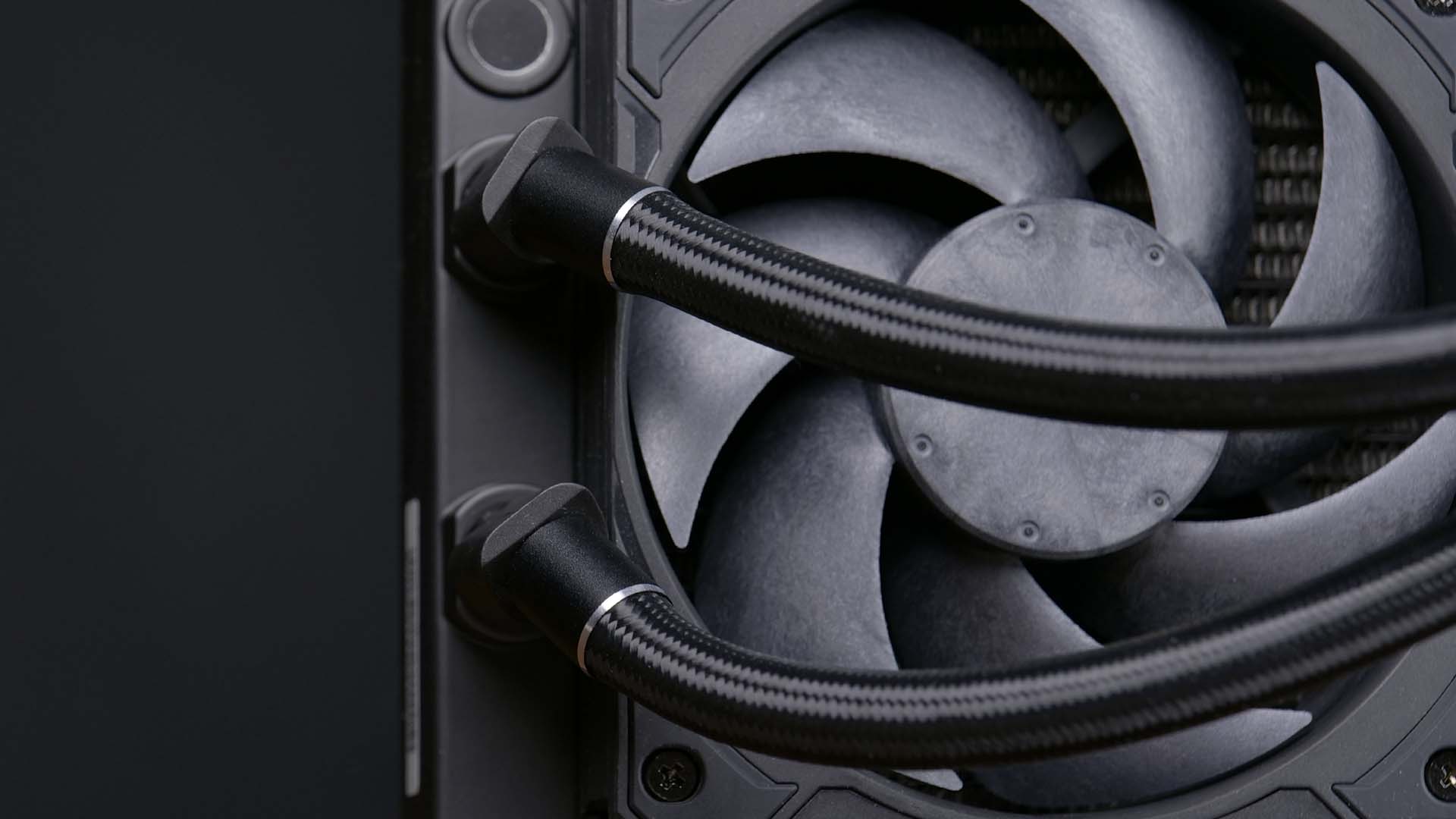
Design-wise, these fans are something of a mystery too. The outer frame bears an incredible resemblance to the recently released Lian Li P28. The fan wing design on the other hand looks like a Phanteks T30 replica.
However, being 28mm thick, they are not necessarily T30 clones, but the design was definitely inspired. Something that seems like an obvious choice given the T30s supreme radiator performance.

Another aspect that traveled from the P28 to the fans on the Galahad II is the speed switch. Similarly to the P28, we have a little speed switch allowing the user to throttle the fans to max. 2300RPM. But inlike the P28, there is no third silent mode.
Base & Pump
Another aspect of the AIO which got a huge upgrade is the Base and Pump. On the inside, we will find the same pump Lian Li used in previous iterations of this cooler, however, one step above, both the impeller as well as the redesigned water distribution plate have been fully redesigned.

If we go even further, the copper plate responsible to transfer the heat has also seen some major updates with its greatly reduced fin thickness.
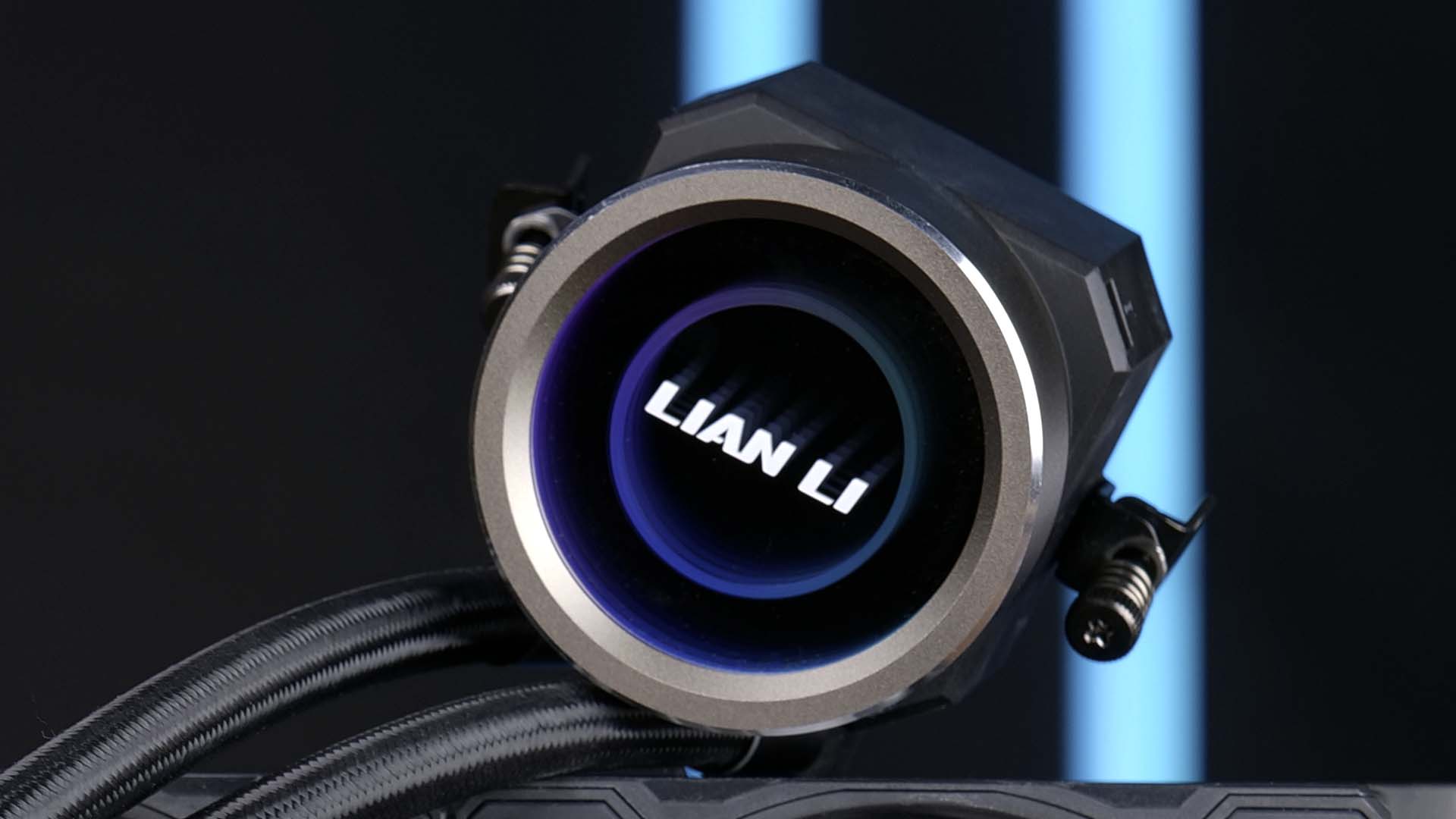
Compared to the regular Galahad II Trinity, the fins on the cold plate are even a little higher, making them even better performing.
Appearance
Although the Galahad II Trinity is a Lian Li product, it does not yell "Lian Li" as much as anything else they ever released.
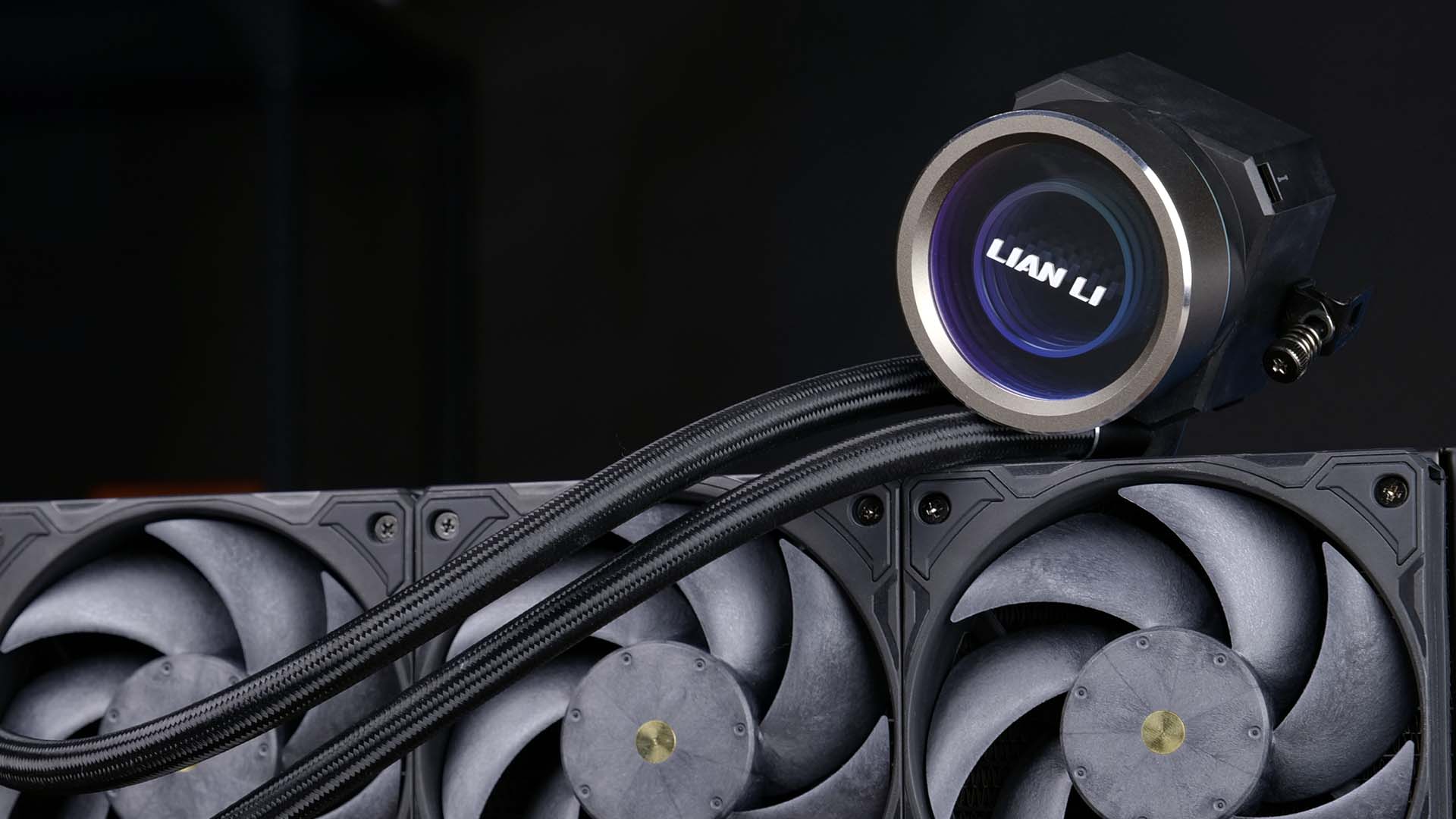
Except for the Water block - pump combo, everything about the Galahad II Trinity Performance is either Black or White. Thanks to the fans being made out of LCP instead of the usual plastic, they are shining in the iconic grey color similarly to the Phanteks T30.
All in all, the Galahad II Trinity Performance looks relatively simple given the single color choice. A choice the user may want or not want, but it creates the perfect basis for an all-black build.

The only aspect that does not fall under the all-black category would be the pump cover. Covered in infinity rings and a big brand logo, this is the only reminder that it's actually a Lian Li product.
However, instead of forcing a universal design, Lian Li includes 3 additional cover parts. The User can choose to remove the original "Lian Li Infinity Mirror" and replace it with either the Dazzle Mode or Sink Hole, two designs that look quite different from the original.
Benchmark
We benchmarked the cooler using our new CPU Cooler Benchmark Machine featuring 3 different Workloads at 320, 250, and 120W.
120W
On the "light" workload at 120W, the Galahad II Trinity Performance already shows it's domination. Keeping the 13900k at 26.6°C above ambient, there is nothing that managed to do this.

On the Noise to performance graph, the domination might not look quite as dominating. Although the Performance version managed to stay at the first spot for almost the entire run, it lost against the Alphacool Core Ocean T38 420 for a very short while.

250W
Pushing the heat up to 250W slightly changed the picture. At max fan speed, the Galahad II Trinity managed to stay on the first spot, but with a bigger gap.

On the Noise-to-Performance graph, a lot of things changed. With every AIO now performing at heatloads they were actually intended for, the Galahad Struggles sometimes to keep up with the regular Trinity version.

320W
For the max power mode at 320W however, we can see why Lian Li implemented that double wave fin.
While allowing every cooler's fan at max fan speed, most air coolers and smaller AIOs are already out of the race and only the biggest and best are left.

For those who are left, the Trinity II Performance managed to show why it is indeed the best. With the gaps between the coolers now being significantly bigger, there is nothing that comes even close as for now.
The Noise to Performance graph does not look as golden on the other hand. Although the Galahad managed to beat everything in the very high fan speeds, once the fans spin slowly enough, the superior thickness of the Core Ocean T38 420 takes over and leaves the Trinity II Performance slightly behind.
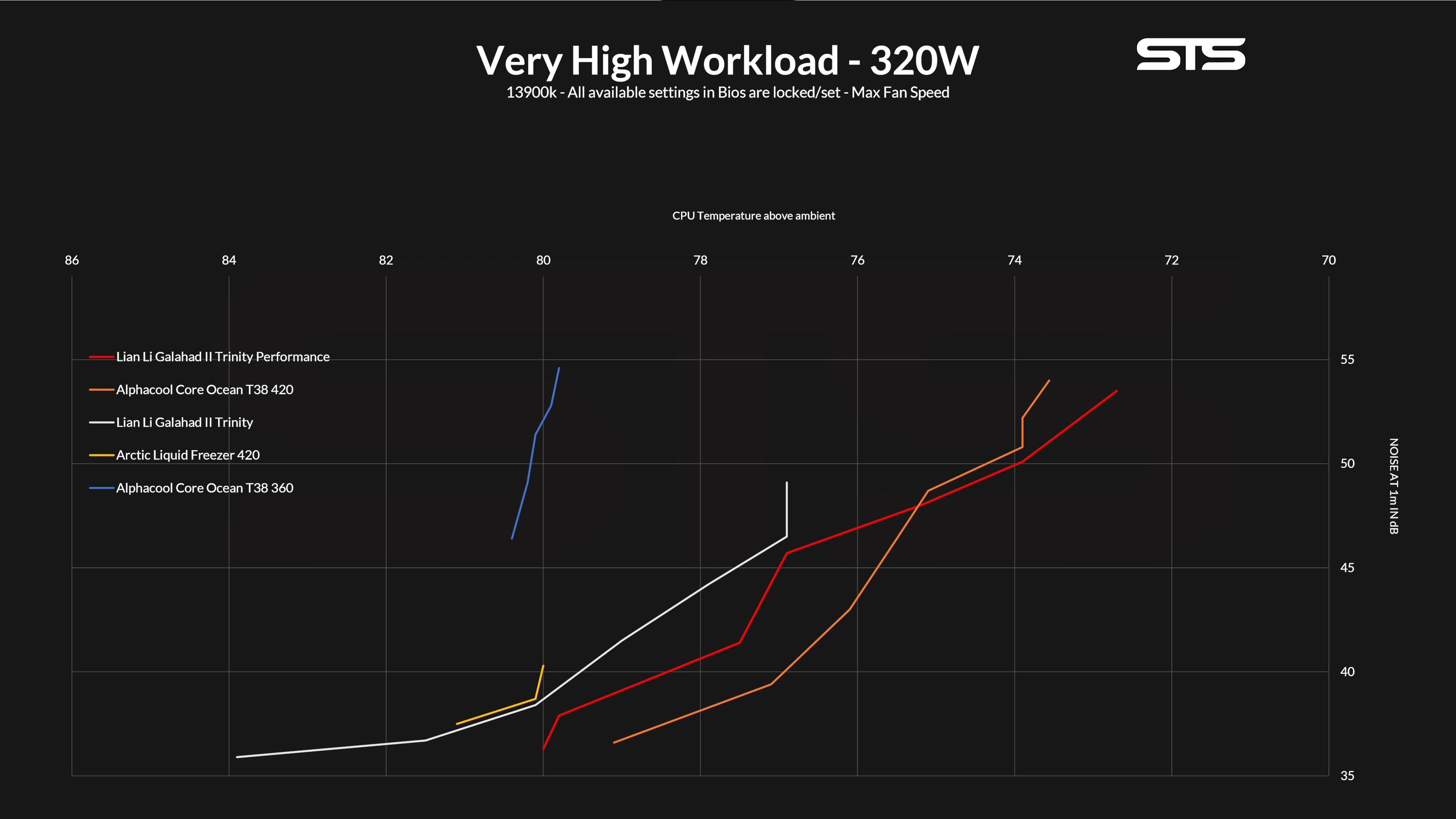
Conclusion
Max performance-wise, there is nothing that comes even close to the Galahad II Trinity Performance. In every power profile, the Performance version reigned supreme and outperformed them all.
Nosie-wise, it might not look as good, but still relatively good considering the potential. Compared to most, it beats them hands down, but once you compare it to the really thick and not-dense models, their relatively strong "passive" performance gives them the benefit.
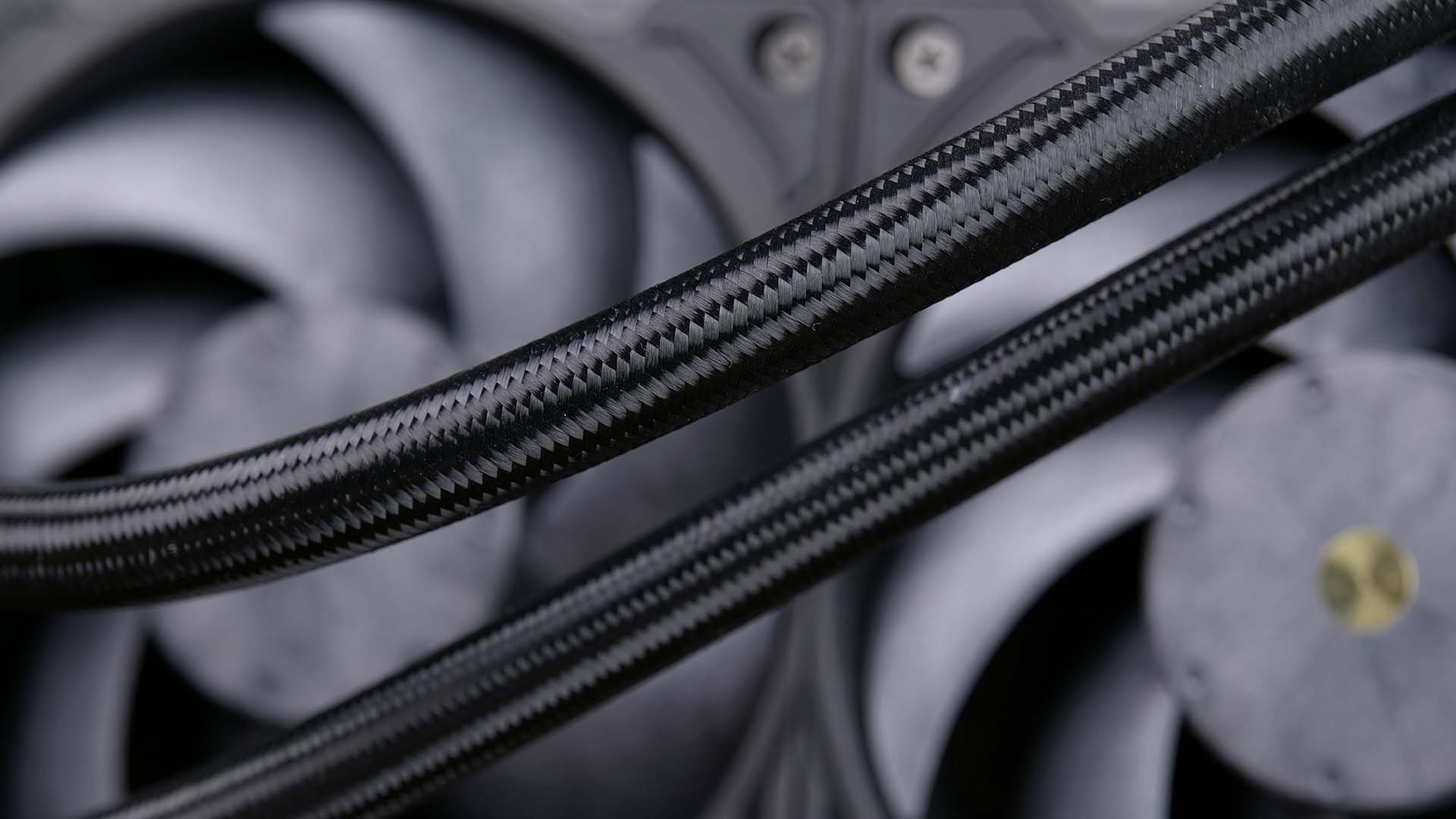
Design-wise, it is finally something new from Lian Li. All in all, it is looking incredibly clean. All black with a touch of grey thanks to the LCP fans. The only eye-catcher would be the RGB implementation on the Pump cover in the form of multiple RGB Infinity rings. If these rings are not your thing, however, you can always choose one of the different milky-style designs if you prefer so.

In the end, the Lian Li Galahad II Trinity Performance seems to be the best-performing AIO out right now, something that may be incredibly important considering the amount of heat the last few generations of chips create. It seems like the double-wave fin design was worth it.
If it wasn't clear enough, we are positively surprised with the improvements that Lian Li implemented and the benefits they've created. Not only performance-wise but also the little things like the improved tubes with rotating 45° fittings and bigger inlets and outlets.

All in all, there is nothing else to do than to recommend the Galahad II Trinity Performance due its superior performance for the latest high-power chips. For lower-end chips, you might be better off with a weaker AIO like the regular Galahad II due to the fans being slightly quieter at max speed and not requiring additional performance. But if you are looking for the absolute max performance, the Lian Li Galahad II Trinity Performance is the right choice.

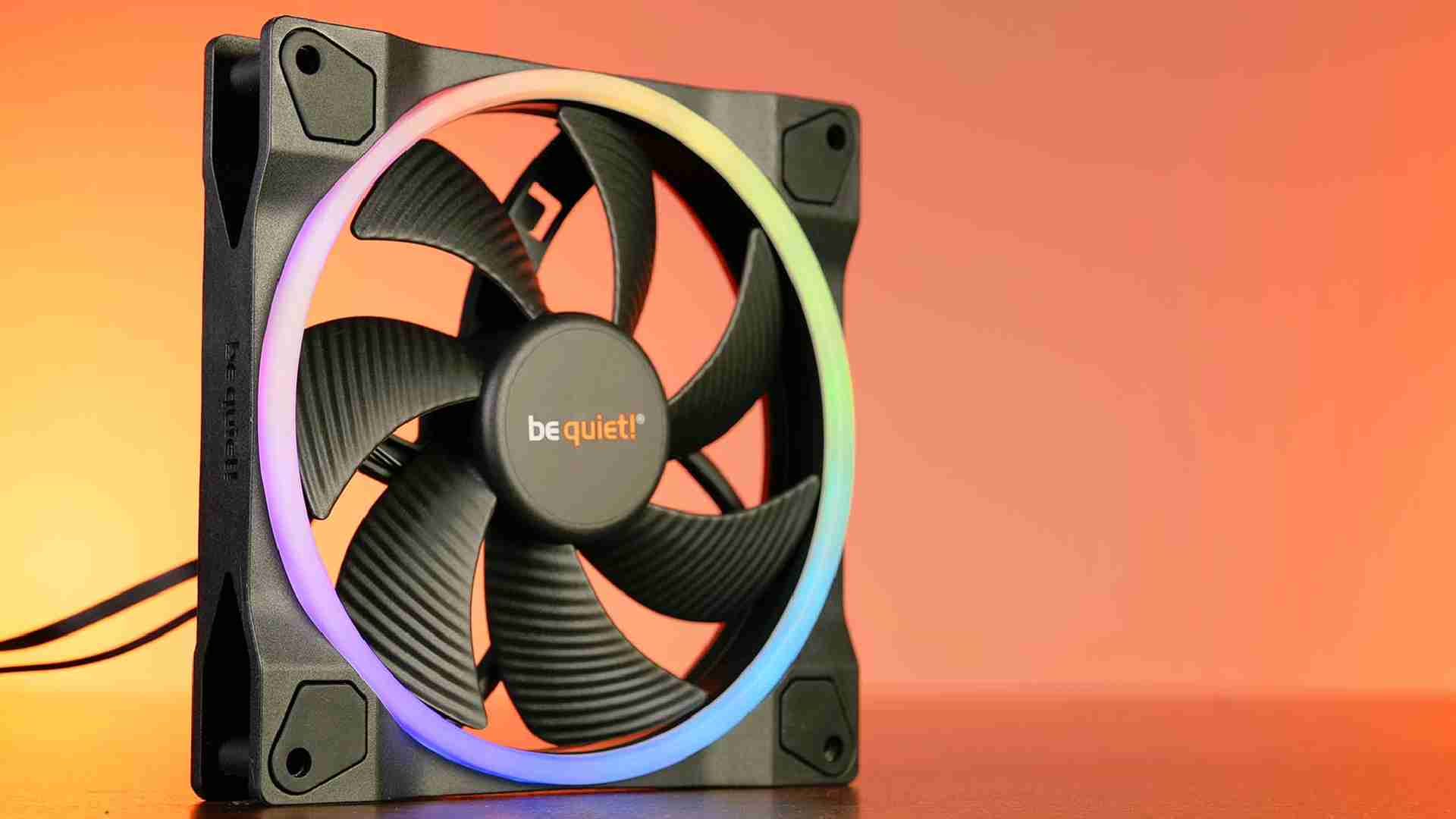
be quiet! Light Wing 140mm Review
The 120mm Light Wings Lineup was pretty much a Success while the 140mm High Speed set was not quite able to keep up due to th
Read More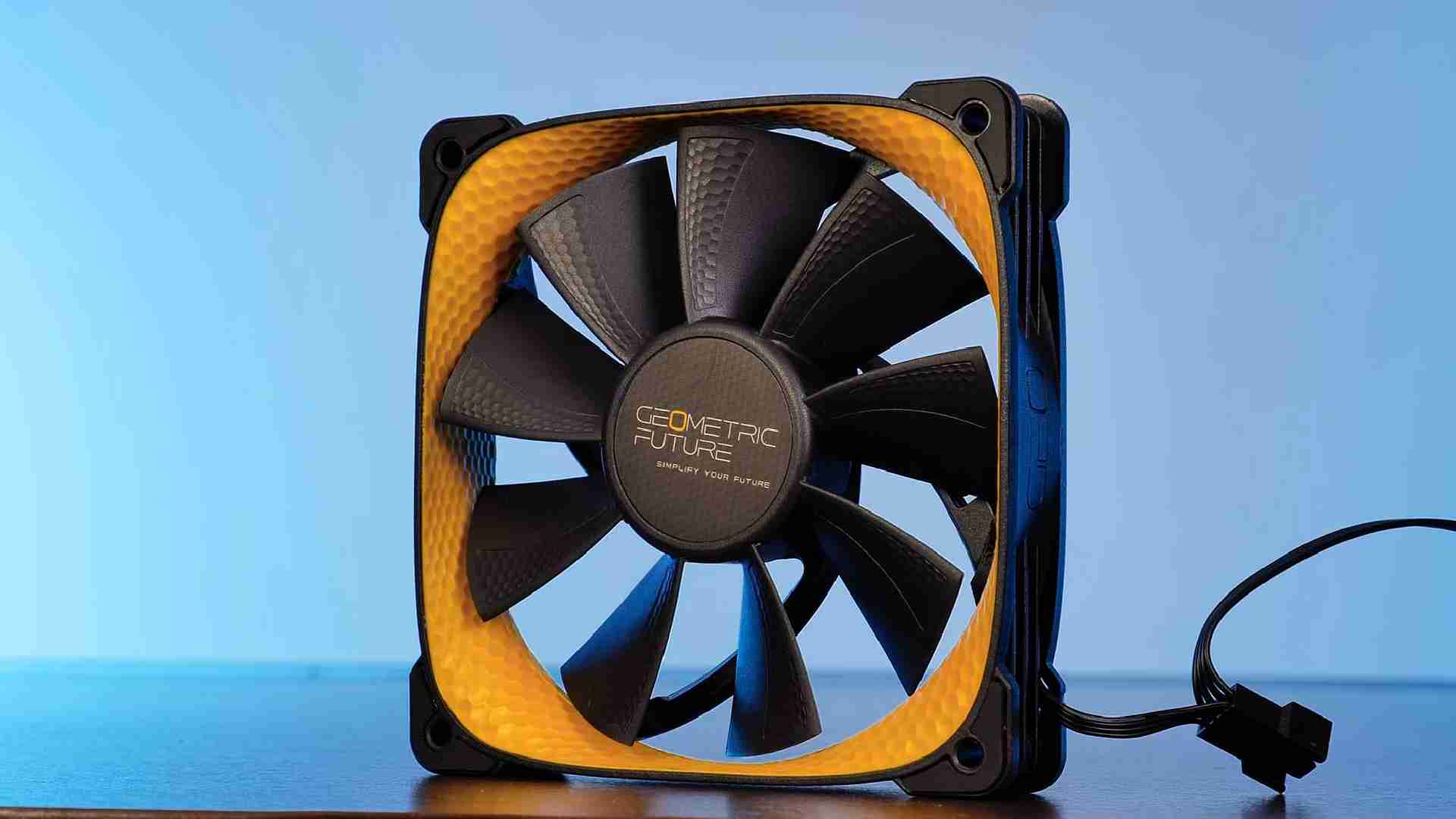
Geometric Future Squama 2505 Review
With their Squama 2505, Geometric Future promises exceptional performance at peak Static Pressure! Lets find out how well the
Read More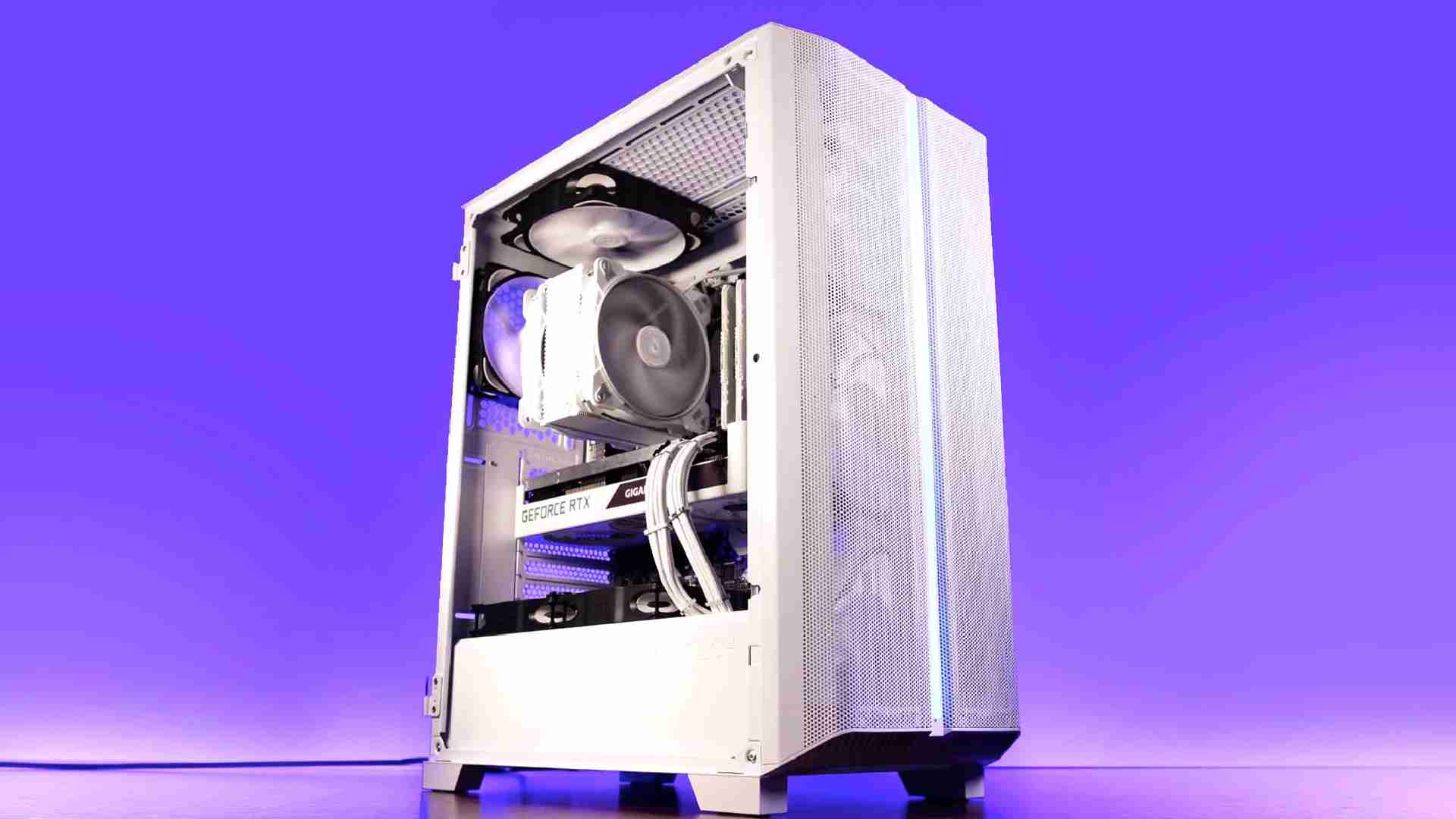
Montech Sky One Lite Review
While the Montech Sky One was already a very impressive case, Montech went back to the drawing board and improved quite a few
Read More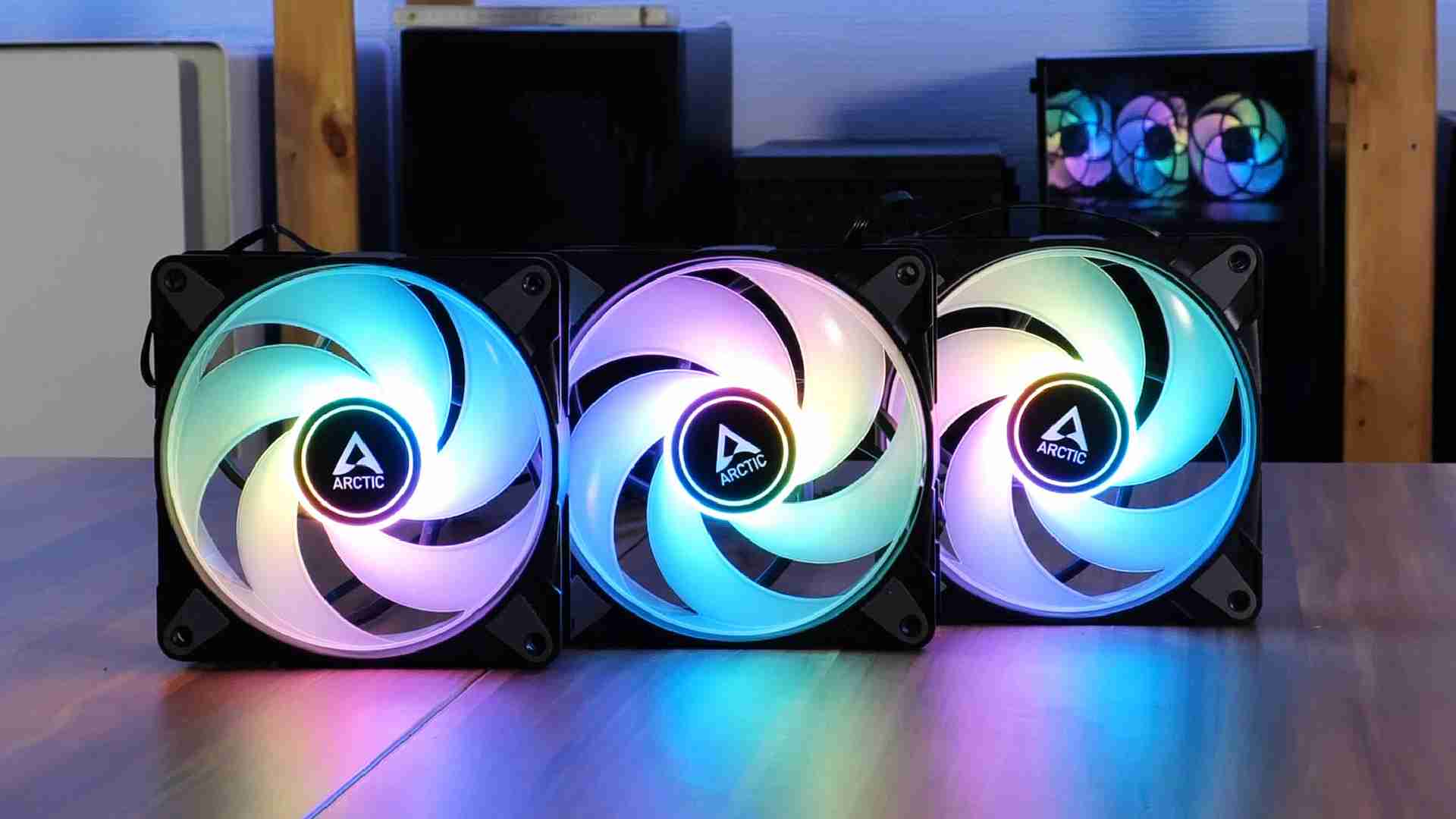
Arctic P12 ARGB 0db Review
Its undeniable that we at STS are huge fans of Arctics P12 Fans! Now Arctic decided to slap a couple of RGBs in the center! B
Read More